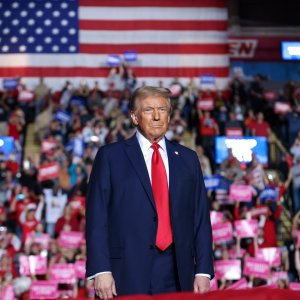Trump's plans for America—What will change now that he’s president?
By
Aubrey Razon
- Replies 0
Following a historic election, the United States begins a new chapter under President Donald Trump's leadership. The nation is preparing for potential shifts as political reforms take shape.
With Trump's victory, policy changes are anticipated that could redefine the American landscape and its future direction.
He envisions the initiation of what he describes as “the largest deportation program in American history,” leveraging the Alien Enemies Act of 1798.
The logistics and ethical implications of deporting over 11 million undocumented immigrants are complex, with significant financial and human resource investments required.
Trump's stance on immigration extends to withholding federal police grants from local law enforcement agencies that refuse to participate in deportations.
He plans to end “catch and release,” reinstate “Remain in Mexico,” and resurrect Title 42, which denies asylum seekers entry on public health grounds.
Trump also aims to ban sanctuary cities and request funding for 10,000 new border agents.
He also seeks to ensure federally funded benefits are reserved for American citizens, signaling a shutdown of the Department of Homeland Security's CBP One app within his first 24 hours in office.
His plan includes eliminating taxes on tips, overtime, and Social Security benefits, alongside a tax credit for family caregivers.
Collaborating with Elon Musk, Trump aspires to dismantle federal regulations that, in his view, inflate prices and stifle job growth.
He proposes a regulatory trade-off: for every new regulation, ten must be eliminated.
Yet, he intends to maintain the Affordable Care Act, a testament to its popularity.
Trump's tax strategy includes reducing the corporate tax rate to 15% and imposing tariffs on imported goods and businesses from countries that resist using the US dollar as their reserve currency.
This “America First” approach extends to his promise to reinstate the state and local tax deduction (SALT), which was capped under his previous administration.
He pledges to halve consumer energy prices within a year and promote fracking and drilling to achieve energy independence.
He has expressed interest in constructing a missile defense shield akin to Israel's Iron Dome.
He advocates for a drastic reduction in the Education Department's size and influence, focusing on core subjects and eschewing “woke” teachings.
He has called for the prosecution of political rivals and officials involved in the Jan. 6 investigation and plans to appoint a special prosecutor to target Joe Biden and his family.
The impact of these changes will likely be felt across various sectors, from the economy to social issues, affecting communities in different ways.
While uncertainty always accompanies political transitions, the country has faced many such moments before, and this new chapter will bring its own challenges and opportunities.

How do you feel about the proposed changes? What impact do you foresee on your daily life and the broader American society? Share your thoughts and insights in the comments below.
As we discuss these developments, let's keep the conversation respectful and thoughtful, encouraging constructive dialogue as we move forward.
With Trump's victory, policy changes are anticipated that could redefine the American landscape and its future direction.
Sealing Borders and Immigration Overhaul
President Trump has long emphasized the importance of border security, and his re-election amplifies his commitment to “seal” the southern border.He envisions the initiation of what he describes as “the largest deportation program in American history,” leveraging the Alien Enemies Act of 1798.
The logistics and ethical implications of deporting over 11 million undocumented immigrants are complex, with significant financial and human resource investments required.
Trump's stance on immigration extends to withholding federal police grants from local law enforcement agencies that refuse to participate in deportations.
He plans to end “catch and release,” reinstate “Remain in Mexico,” and resurrect Title 42, which denies asylum seekers entry on public health grounds.
Trump also aims to ban sanctuary cities and request funding for 10,000 new border agents.
He also seeks to ensure federally funded benefits are reserved for American citizens, signaling a shutdown of the Department of Homeland Security's CBP One app within his first 24 hours in office.
Economic Ambitions and Tax Reforms
Trump's economic blueprint promises to “end inflation” and introduce “historic” tax cuts for workers and small businesses.His plan includes eliminating taxes on tips, overtime, and Social Security benefits, alongside a tax credit for family caregivers.
Collaborating with Elon Musk, Trump aspires to dismantle federal regulations that, in his view, inflate prices and stifle job growth.
He proposes a regulatory trade-off: for every new regulation, ten must be eliminated.
Yet, he intends to maintain the Affordable Care Act, a testament to its popularity.
Trump's tax strategy includes reducing the corporate tax rate to 15% and imposing tariffs on imported goods and businesses from countries that resist using the US dollar as their reserve currency.
This “America First” approach extends to his promise to reinstate the state and local tax deduction (SALT), which was capped under his previous administration.
Environmental Policies and Energy Independence
In a controversial move, Trump plans to revoke an electric vehicle rule set by the Biden administration and withdraw from the Paris Agreement once more.He pledges to halve consumer energy prices within a year and promote fracking and drilling to achieve energy independence.
Foreign Policy and Defense
Trump's foreign policy agenda includes bold claims, such as resolving Russia's war in Ukraine within a day and preventing “World War III.”He has expressed interest in constructing a missile defense shield akin to Israel's Iron Dome.
Cultural and Educational Shifts
Trump's campaign leaned into cultural issues, with promises to cut federal funding for schools that promote critical race theory or transgender rights.He advocates for a drastic reduction in the Education Department's size and influence, focusing on core subjects and eschewing “woke” teachings.
Legal and Political Retribution
Following his conviction of falsifying business records, Trump has positioned himself as a victim of political persecution, vowing “retribution” against his adversaries.He has called for the prosecution of political rivals and officials involved in the Jan. 6 investigation and plans to appoint a special prosecutor to target Joe Biden and his family.
The Road Ahead
As President Trump's plans unfold, the nation watches closely to see how his policies will take shape.The impact of these changes will likely be felt across various sectors, from the economy to social issues, affecting communities in different ways.
While uncertainty always accompanies political transitions, the country has faced many such moments before, and this new chapter will bring its own challenges and opportunities.
Key Takeaways
- Donald Trump has won the presidency and is expected to focus on key issues such as immigration, the economy, and foreign policy upon his inauguration on January 20.
- He plans to implement stringent immigration policies, including the sealing of the southern border, ending “catch and release”, and reviving “Remain in Mexico” policy.
- On the economic front, Trump intends to “end inflation”, offer historic tax cuts, collaborate with Elon Musk on reducing federal regulations, and maintain elements of the Affordable Care Act.
- In foreign policy, Trump has claimed he could end Russia's war in Ukraine within a day and has clear stances against certain immigration practices and environmental agreements like the Paris Agreement.
As we discuss these developments, let's keep the conversation respectful and thoughtful, encouraging constructive dialogue as we move forward.
Last edited:







